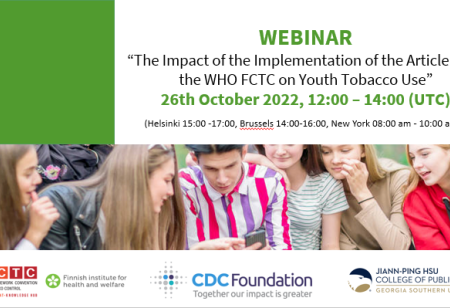
Third webinar of the series on 9 November 2018 - 29 October 2018

Third webinar of the series: monitoring of tobacco control policies
The webinar of the Knowledge Hub on Surveillance on November 9 at 12:00 UTC covers the topic of monitoring of tobacco control policies. Check your local time for the webinar here.
The upcoming webinar is the third part of the series on supporting low and middle income countries in the establishment of tobacco surveillance systems in line with the Article 20 of the WHO FCTC.
The flyer of the third webinar can be downloaded here.
Sign up for all webinars through this link.
Presentations will be available on the website of the Knowledge Hub on Surveillance shortly after the webinar.
Speakers of the webinar

Prof. Geoffrey T. Fong, Ph.D., FRSC, FCAHS
University of Waterloo, the International Tobacco Control Policy Evaluation Project
Dr. Geoffrey T. Fong, Ph.D., FRSC, FCAHS is Professor of Psychology and of Public Health and Health Systems at the University of Waterloo, and Senior Investigator at the Ontario Institute for Cancer Research.
Dr. Fong is the Founder and Chief Principal Investigator of the International Tobacco Control Policy Evaluation (ITC) Project, a research consortium of over 150 researchers across 29 countries, covering over two-thirds of the world’s tobacco users. The ITC Project is the world’s largest tobacco research program, focusing its efforts on evaluating the effectiveness of tobacco control policies of the WHO Framework Convention on Tobacco Control (FCTC).
Dr. Fong was one of the three scientific editors of the 2017 WHO/NCI Monograph, The Economics of Tobacco and Tobacco Control. He was a member/technical coordinator of the FCTC Impact Assessment Expert Group (chaired by Prof. Pekka Puska). Dr. Fong has served as an expert for the WHO and for many countries including Canada, Brazil, the United Kingdom, and Singapore across a broad range of tobacco policy and regulatory domains, including health warnings, smoke-free laws, additives and flavourings, and plain/standardised packaging. Dr. Fong was an expert for Australia and Uruguay in their successful defenses of tobacco control policies that were challenged via trade treaties.
Among Dr. Fong’s awards are a 2013 WHO World No Tobacco Day Award, a 2015 Luther L. Terry Award for Outstanding Research Contribution, the 2017 Policy Impact Award from the American Association for Public Opinion Research, and the 2019 John Slade Award from the Society for Research on Nicotine and Tobacco. He is a Fellow of the Royal Society of Canada and the Canadian Academy of Health Sciences.

Prof. Anton Kunst, Ph.D.
AMC, University of Amsterdam
Professor Dr. Anton E. Kunst (1960) is professor of Social Epidemiology and Head of Department of Public Health at Amsterdam UMC, University of Amsterdam. His main interests are with environmental determinants of health outcomes and health-related behaviours, and the impact of preventive policies in particular those related to tobacco and alcohol use.
He has coordinated several EU funded international research projects. He currently leads the Horizon2020 project SILNE-R on the prevention of youth smoking in 7 European countries. His Department is a leading centre in The Netherlands on tobacco research, with several research and interventions projects on smoking prevention or cessation support. The Department has much experience in the use of innovative methods of qualitative research for the understanding of people’s tobacco use and the impact of tobacco related policies.
Dr. Kunst is a prolific author in this field, with about 400 co-authored peer reviewed papers in international scientific journals. In these publications, he has applied a diversity of approaches for the evaluation of tobacco control policies in real world settings. He has much experience with using quantitative, epidemiological approaches to determine the real-world effectiveness of policies, including intervention cohort studies, time series analyses, and cross-national comparisons.
In addition, he has expertise with using qualitative approaches to understand the strength (or weakness) of tobacco control coalitions, the (lack of) development of new control policies, and the (lack of) response to such policies on part of adolescents. His general work takes a “realist” perspective, which focuses on “why” policies fail or work, and “how” they can be made more effective.
This activity is carried out from a grant provided by the Government of Norway, through the Secretariat of the WHO Framework Convention on Tobacco Control (WHO FCTC), and from a grant provided by the Finnish Ministry of Social Affairs and Health.





